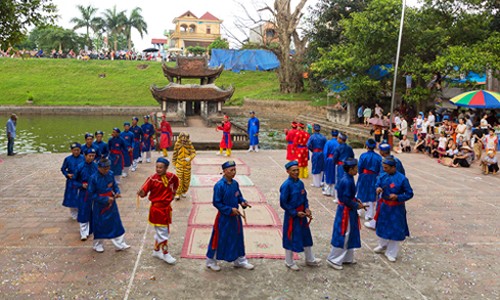(VOVworld) – Ai Lao singing and dancing is a traditional ritual only seen at the Giong festival in Phu Dong village, Gia Lam district, Hanoi. Ai Lao, one of the rare remaining ancient art forms of Vietnam, has spiritual, historical and cultural significance that needs to be preserved and promoted.
According to legends and stories by village elders, the establishment of the Ai Lao singing and dance troupe was associated with the legend of Saint Giong. Under the reign of the 6th Hung King, the Van Lang kingdom was occupied by the northern invaders. A villager called Giong rode an iron horse to fight the foreign troops. After defeating the enemy with a resounding victory, Giong rode the iron horse up the sky, leaving his mother weeping for his absence. So, the King ordered the buffalo children in Hoi Xa village to sing songs to comfort her. That’s the way Ai Lao singing and dance was born. Nguyen Trong Hinh, Head of the Ai Lao Art Troupe, said they are preserving 12 old songs. In the Saint Giong festival, the troupe sings songs for various rituals such as a song for presenting offerings, a song for the prayer ritual at the Upper Temple, a song for praying to the Saint Mother, a song telling the legend Saint Giong and a song to celebrate victory. Mr. Hinh said Ai Lao has its own unique features: “The most special characteristic of Ai Lao singing is that the verses of 6 or 8 words are added with repetitive words, creating the rhythm. The vocal is accompanied with musical instruments like drums. For example, “Climbing a red silk cotton tree, high, a, a, high. Climbing a, a up, climbing a, a up. Rumor goes that Giong festival, Giong festival is. Very cheerful a này, very cheerful a này”.
 |
| A performance of Ai Lao (Photo: Center for Cultural Heritage Research and Promotion) |
Ai Lao is sung in choir, making the Giong festival more sacred and magnanimous. Prof. Dr. Nguyen Van Huy, Deputy Director of the Center for Cultural Heritage Research and Promotion, said: “A long time ago, Ai Lao singing and dance played an important role in making the Giong festival unique because the songs are of great spiritual significance like messages sent to Saint Giong. The Holy Mother is symbolized and stylized. Ai Lao singing and dancing contain cultural and historical stories passed on from one generation to another. If a performer misses a part of lyrics, he or she will devalue the song”.
Ai Lao performers should be male villagers. The Ai Lao Art Troupe has 28 members and the youngest is 35 years old. So the troupe is seeking the next generation. Nguyen Ba Tran, who has joined the troupe for 30 years, said: “The previously rule stipulated that only male villagers were eligible to be a member of the troupe. Now we are getting old and need to recruit young people. Those who have undergone Ai Lao training courses will have a greater chance to be recruited”.
Since 2015 the Hanoi Department of Culture and Sports has worked with the Center for Cultural Heritage Research and Promotion to implement a project on studying and protecting the social customs of Ai Lao singing and dancing. A publication of 12 past and present Ai Lao songs has been released. The Hanoi Department of Culture and Sports has asked the Ministry of Culture, Sports and Tourism to designate Ai Lao as an national intangible cultural heritage.